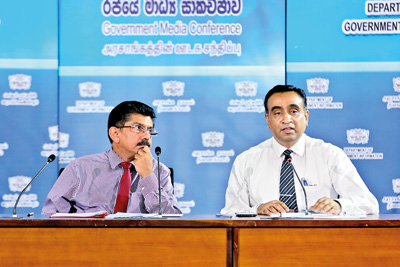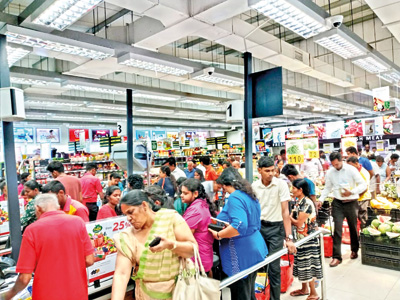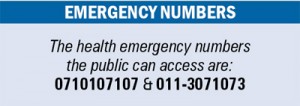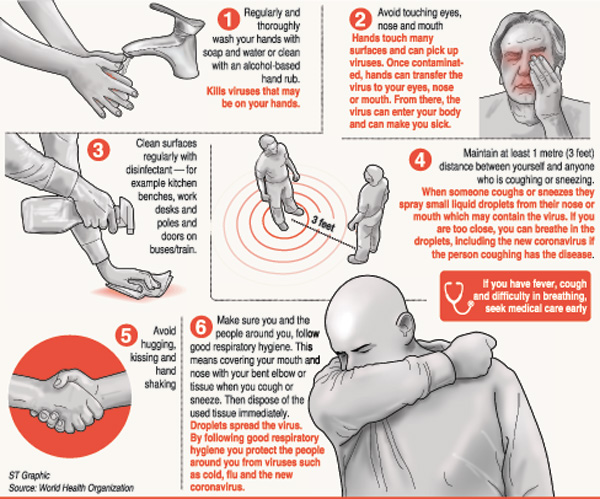News
COVID-19 is here, but don’t panic
Multiple crucial events occurred simultaneously in Sri Lanka and across the world as the new coronavirus continued its rampage, spreading mass fear and panic, which officials in the country said were unwarranted.

Dr. Anil Jasinghe; the Director-General of the Government Information Department and Nalaka Kaluwewa at Friday's news conference. Pic by Sameera Weerasekera
As Sri Lanka detected its first confirmed local case infected with COVID-19 this week (on Tuesday, March 10), followed by nine more (at the time of going to press), there was a frenzy of panic buying in attempts to stock up food and other commodities.
There is no food shortage and everything including essential items are available, the Information Minister Bandula Gunawardana told a media briefing last afternoon, with Essential Food Commodities, Importers & Traders Association President G. Rajendran stressing that there is no shortfall in the wholesale market and there is no need to panic.
There is a small scarcity of big onions but that too would ease when stocks from India arrive on Monday, said Mr. Rajendran.
With the rumour-mill working overtime and social media jumping into the fray, some sources alleged that “fake news was spreading faster than the virus.”
Check any information from official sources before sending it out to the public – was the strong plea from several government quarters this week including the Director-General of Health Services, Dr. Anil Jasinghe; the Director-General of the Government Information Department, Nalaka Kaluwewa; and the Consumer Affairs Authority Chairman Major-General (Retired), D.M.S. Dissanayake.
They kept assuring that there is “absolutely” no need for panic buying or for fear.
With regard to the first Sri Lankan detected with COVID-19, in the country – the 52-year-old chauffer tourist guide from the Colombo district and the second, a 44-year-old who had come into contact with him at Dambulla, Dr. Jasinghe said that both are being managed and treated in isolation at the National Institute of Infectious Diseases (NIID).

Panic shopping on Thursday. Pic by Nilan Maligaspe
“The two patients had slept in close quarters,” he told a media briefing on Friday, explaining that 60 contacts of the first patient and 25 contacts of the second patient have been traced. Five contacts of the first patient and eight contacts of the second patient are “suspected” cases and are in some of the designated hospitals. The others including the patients’ family members are being quarantined in their homes.
Dr. Jasinghe said that both the WHO and the Asian Development Bank (ADB) have offered their support to Sri Lanka.
The WHO would give Sri Lanka equipment worth US$ 100,000, while the ADB has allocated a $600,000 grant from the Health System Enhancement Project to finance preventive and response efforts in the country, it is learnt.
Meanwhile, giving details of the first patient, an Italian-speaking chauffer tourist guide, the President of the Chauffeur Tourist Guide Lecturers’ Association (CTGLA), Chandima Jayaweera, said that having worked in Italy for some time, this person had returned to Sri Lanka and followed a course in chauffeur guiding in 2007, before working freelance for companies. He has a seven-seater van and in the last few weeks he had taken two or three different Italian groups on tours.
The CTGLA has a membership of around 1,200 active members.
“When another guide met the person now affected by COVID-19 on February 27 too he had had ‘a little cough’,” he said, adding that they believe that the last tour from March 3-8 was with a family of Italians. Many Italian tourists come on short tours, with the popular spots visited being Dambulla and Kandy and sometimes finally a beach resort.
The usual routine of these chauffeur guides is to go to the company from which they have got a tour and pick up the tour-pack which gives all the details of the tour. On the due date, the guides then head to the airport and pick up their clients and follow the tour route. Once the tour is over, they either drop them off at the airport or at the last resort where the Italians may spend a few more days. While a particular tour group stays in the hotels booked prior to their arrival by the company, the guides get lodgings for the night in a dormitory at these hotels. Some of the dormitories can accommodate over 40. 
Mr. Jayaweera said that at a meeting held with the Sri Lanka Inbound Tour Operators (SLITO) on Friday, the CTGLA had requested the temporary stoppage of tourists arriving in Sri Lanka, but the decision is pending.

No shortage of drugs, so be calm – SLCPI
Despite the global impact of the new coronavirus, there is no shortage in the availability of essential drugs in Sri Lanka, assured the Sri Lanka Chamber of the Pharmaceutical Industry (SLCPI), urging people to be calm.
SLCPI said: “All major pharmaceutical importers have an inventory and stock for at least three months and sometimes even more. So panic buying of medicines as a reaction to the coronavirus is unnecessary.”
SLCPI’s Chairperson Kasturi Chellaraja reiterated that “we need to be sensible and judicious in our reaction and not panic. There is currently enough stock to meet three months of normal demand and we will make sure that the supply chain is not disrupted”.
The statement was issued in the wake of several reports from pharmaceutical retailers that customers were buying as much as two to three months’ supply of drugs.
“We need to be rational about this and there’s a lot of irrationality going on out in the community, owing to scare-mongering,” Ms. Chellaraja said, adding that Sri Lanka is a small market and the excellent relationship that their chamber members have with multinational pharmaceutical manufacturers worldwide, will ensure that they will not run out of stock.
She also cautioned consumers that knowledge on storage is vital – failure to correctly store an overstock of medicines at home, can affect the efficacy of the medicine. “For example, cartons protect the product from light which can otherwise degrade the product; sometimes desiccants are used to protect the product from moisture.”
The SLCPI stated that its membership of pharmaceutical importers was monitoring its supply chains closely and is confident that there would be no interruption. Despite the fact that 60% of the active raw material for drugs is manufactured in China, Europe remains the largest manufacturer of pharmaceuticals and although most imports to Sri Lanka are from India with India, in turn, dependent on China for raw material, the risk of running out of essential medicines in Sri Lanka is slim.
Focus on hospitals/clinics & their protocols
Highlighting the importance of the “critical role” that will be played by hospitals and clinics in the response to a COVID-19 threat in Sri Lanka, former Chief Epidemiologist Dr. Nihal Abeysinghe said it is vital to establish protocols for triaging and isolating patients suspected of having the infection in emergency departments so that they do not infect others.
Establishing procedures for outpatient clinics, dialysis centres and other medical facilities, especially private hospitals, is important so that COVID-19 does not disrupt normal medical care and also does not compound the direct disease and death caused by the virus, he said.
According to this expert, protecting healthcare workers and preventing nosocomial infection (acquired in a healthcare facility) – which have been major problems in China – will need:
- Planning at hospital administration
- Special training of hospital staff and use of personal protective equipment (PPE).
- Ensuring regular supplies of PPE for healthcare workers
- Specific preparation in critical care interventions in ICUs
- Evaluation of ICU bed capacity, the ability to augment ICU-level bed space, mechanical ventilator stock and supply chains, and the logistics of isolating and cohorting patients.
- Planning for allocation of scarce resources
- Adherence to existing guidance for pneumonia, sepsis etc.
- Clear information for clinicians and public health experts regarding the operating characteristics of SARS-CoV-2 diagnostic tests. They need to know the false-positive, false-negative and predictive values of these tests to make the best clinical and public health decisions.
Dr. Abeysinghe is categorical that as more countries report cases, including those with no link to the disease epicentre, it is clear that there are many more unrecognized cases in the world and that community transmission may be happening in many countries. The most “important” public health interventions to slow the spread will be rapid diagnosis and isolation of cases.
“At this early stage of the epidemic in Sri Lanka, when the number of cases is low, public health workers should track contacts of cases to the extent resources allow and have them stay home for the virus’s incubation period of two weeks. However, beyond a certain threshold, it will no longer be feasible to track all contacts,” he said.
Public health leaders will also need to clearly communicate to the public about the way that they can lower the risk of infection and spread, he added.
SARS-buster on how to minimize danger
With regard to the first Sri Lankan patient, SARS-buster & Hong Kong University’s Professor of Virology at the School of Public Health, Prof. Malik Peiris said that the incubation period is around 5-6 days with a range going up to 14 days.
“So you can say that the infection occurred within the 14 days before he developed symptoms – very likely 5-6 days but as I said, the range can be up to 14 days,” he said.
What is needed is ‘contact tracing’ of all the people the tour guide was in contact with, especially close contact with, during the time he started symptoms and to put them on medical surveillance, he stressed, explaining that if there has been close contact, those people need to be quarantined for 14 days. “That way you can minimize the risk of having a community spread getting established.”
Scale-up response to COVID-19 – WHO Rep
With the WHO’s assessment that COVID-19 can be characterized as a ‘pandemic’, the WHO Representative for Sri Lanka, Dr. Razia Pendse said it is a pandemic that can be controlled. All countries can still change the course of this pandemic with decisive action.
The great need is for countries to take immediate actions and scale-up response to treat, detect and reduce transmission to save people’s lives. A comprehensive or blended approach should continue, with containment as the major pillar, she said.
“Countries should ready emergency response systems; increase capacity to detect and care for patients; ensure hospitals have space, supplies and necessary personnel; and develop life-saving medical interventions. The need is to prepare and be ready; detect, protect and treat; reduce transmission; and innovate and learn,” Dr. Pendse added.
A pandemic in recent history was the outbreak of the H1N1 influenza in 2009.
We have adequate food stocks – CAA
There is no need for panic buying and stockpiling, said the Chairman of the Consumer Affairs Authority (CAA), Maj-General (Retired) D.M.S. Dissanayake, assuring that there would be no food shortage in the country.
Any attempts by traders to exploit the situation and raise prices would not be allowed, he said, citing a case in the Pettah bulk market where there were moves to raise the price of big onions.
The CAA has officers across the country who would check out whether traders are hiding stocks to create an artificial shortage or selling stuff at a higher price, he added.
The CAA may be contacted by consumers on its hotline: 1977
Sri Lankans affected worldwide
The two Sri Lankans affected by COVID-19 in the United Arab Emirates (UAE) are being treated at the Rashid Hospital in Dubai, while the Sri Lankan woman who was hospitalized in Italy has recovered and returned home.
The two Sri Lankan crew members from the ‘Diamond Princess’ cruise ship who were brought from off the coast of Japan and quarantined in India have tested negative for COVID-19 and arrived in Sri Lanka on Friday night.
Many mass gatherings cancelled or postponed
The government has requested that mass gatherings should not be held as a safeguard against a potential threat from COVID-19 and also urged people to avoid such gatherings and trips.
The different religious leaders took action to stop people from gathering at places of worship yesterday. Buddhist leaders advised their devotees not to gather at temples; the Roman Catholic Church announced that all lenten pilgrimages are cancelled and only the Sunday masses would be held; the Director of the Muslim Religious Affairs Department, A.B.M. Ashraff said that mandatory five-time prayers and Jummah prayers would continue but would be completed within five minutes and mosques would be sanitized, while each worshipper has been told to bring his own prayer mats; and the Hindu Religious Affairs Director, A. Umamaheswaran said the Hindus have been asked to avoid mass gatherings but the normal poojas would be held with precautions.
However, many health sources contacted by the Sunday Times were adamant that any gathering of people, large or small, should be cancelled, in the light of the dangers of the coronavirus.
All cinemas under the National Film Corporation have been closed from yesterday, while the government has advised places such as Nelum Pokuna, BMICH, Elphinstone and Tower Hall to close temporarily.
When contacted, a source at Elphinstone said there was no order for closure by the Cultural Affairs Ministry and it would proceed with its events and it was a similar answer from the BMICH and Nelum Pokuna.
All government, semi-government, private and international schools as well as Sunday and pirivena schools have closed from March 13 to April 20.
However, international schools will have limited classes for those students who would be sitting the British examinations, starting end April, it is learnt.
All tuition classes have been suspended from March 13 to 26, as state universities also put up their shutters till March 26. A decision on the extension of the closure is to be taken depending on the evolving situation. Several private universities have announced that they would be closed for differing periods of time as of yesterday.
Royal Institute, Colombo and Horizon campus will be closed indefinitely; APIIT until March 30; and SLIIT for two weeks.
While the prison authorities are discussing the precautions needed within these institutions, they have requested magistrates to avoid remanding people for petty crimes, a prison source said, adding that they have prepared a separate ward for isolation in the eventuality of the disease coming into the prisons. Discussions on limiting visitors to prisoners are being held.
The England vs Sri Lanka Test cricket matches to be held from March 19 to 23 and March 27 to 31, have been cancelled and no decision taken yet on rescheduling them, said Sri Lanka Cricket Chief Executive Officer Ashley de Silva.
The carnival and education exhibition which was in full swing at the Mahinda Rajapaska Maha Vidyalaya, Pitipana, Homagama attracting large crowds was halted on Friday.
This was as ‘Medivision 2020’, the medical exhibition of the Colombo Medical Faculty linked to its 150th anniversary celebration due to be held from March 30-April 5, has been postponed, said Prof. D.J. Anthony, while the Wildlife & Nature Protection Society (WNPS) has cancelled its monthly lecture on ‘Unwinding the secrets of the elusive Indian pangolin’ which was to be held on March 19.
The quarantining process for those who arrived from high-risk countries
Army Commander Lt. General Shavendra Silva is overseeing the quarantining process of those flying in from high-risk South Korea, Iran and Italy, under the direction of the Health Services DG Dr. Anil Jasinghe, to
“We have the capacity and experience and are trained to tackle any situation, military or otherwise,” said the Director of Media, Army Headquarters, Brigadier Chandana Wickramasinghe.
Earlier, the Chairman of the Bandaranaike International Airport, Major General (Rtd.) G. A. Chandrasiri said that those who flew in from South Korea, Italy and Iran from March 9-13 were quarantined. As of March 12, 1,482 people have been quarantined.
These passengers did not follow the usual disembarkation process but were brought by buses straight from the planes and sent through the health screening and immigration processes, he said, after which the army took over to transport them to the quarantine centres.
Thereafter, these passengers were transported with security in convoys of buses and a vehicle with their luggage and an ambulance following to the quarantine centres where they will be kept for 14 days, the incubation period. If any passenger was found to be ill at the airport, he/she was taken to a designated hospital, Brigadier Wickramasinghe said, adding that army personnel were taking all precautions to protect themselves.
While the Batticaloa campus in Punani and the Kandakadu centre were the initial quarnatine centres, two more, the Kahagolla bus depot and the Diyatalawa army base hospital (where the Sri Lankans brought from Wuhan, China were kept) are also available, he said.
He added that people at the quarantine centres are comfortable and the dormitories have beds with linen, mosquito nets, clothes’ racks, bathrooms with adequate sinks and showers, laundry facilities and also wifi and a common TV. The army is preparing special meals with soft foods such as potatoes, carrots and beans for small children. The quarantined people are checked for any illness and their temperature taken thrice a day at 8 a.m., 2 p.m. and in the night.

